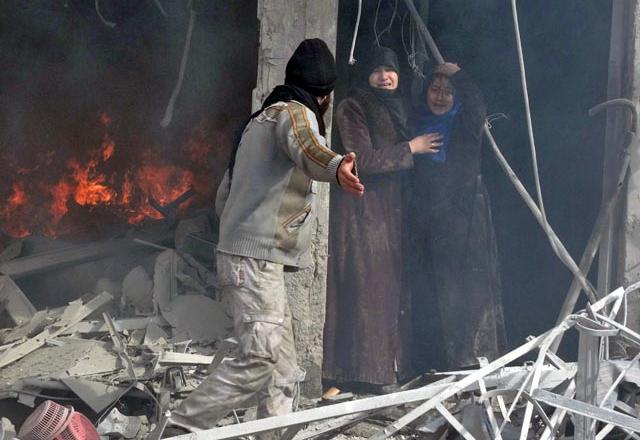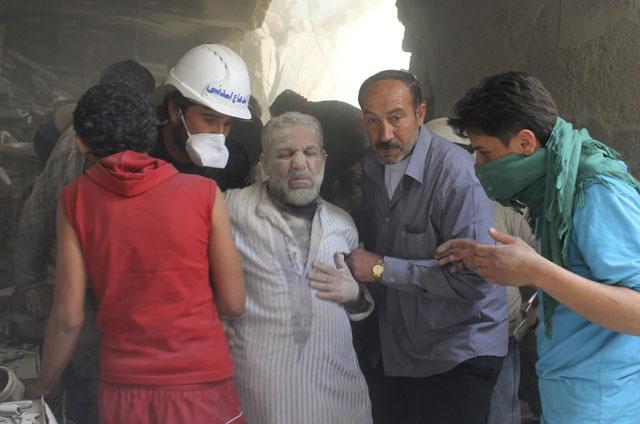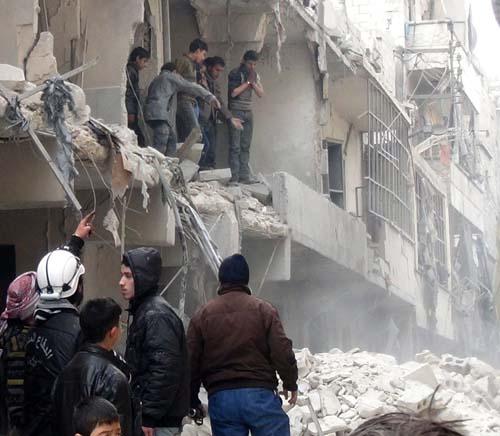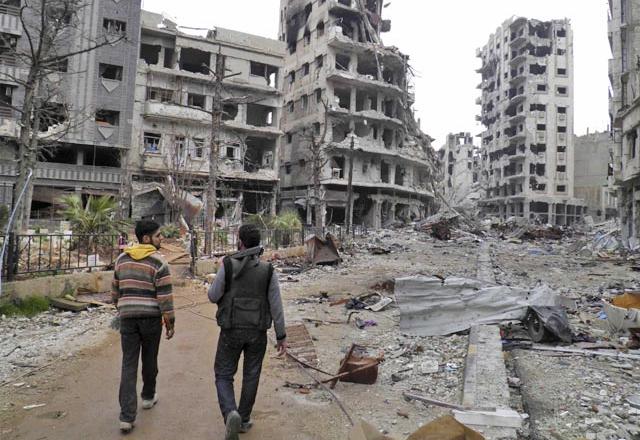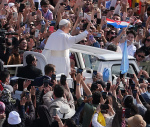GENEVA — Opposing sides in Syria’s civil war stood together in silence to honour victims of the three year conflict on Thursday, but week-old peace talks were still stuck on the question of how to proceed with just one day left before they head home.
The United States said on Thursday it was concerned that Syria was falling behind in a schedule to ship out its chemical weapons stockpiles to be destroyed. Reuters reported on Wednesday that Syria had given up less than 5 per cent of its chemical weapons arsenal and will miss a deadline next week to send all toxic agents abroad for destruction.
The first talks between President Bashar Assad’s government and his foes have been mired in rhetoric since they began a week ago in Geneva.
UN mediator Lakhdar Brahimi said on Wednesday he does not expect to achieve anything substantive in the first round which ends on Friday, but hopes for more progress in a second round, which diplomats expect to begin around February 10.
The sides took a first tentative step forward on Wednesday by agreeing to use a 2012 document for discussions, but it was clear on Thursday, the first day of talks under the agreed road map, that they still disagree about how to proceed.
They began with a rare sybol of harmony: Opposition delegate Ahmad Jakal said his delegation’s head, Hadi Al Bahra, proposed the minute of silence and all sides stood up, including Assad’s delegation and Brahimi’s team.
“All stood up for the souls of the martyrs. Symbolically it was good,” Jakal told Reuters.
But the sides quickly shifted back to their disputes. The government delegation accused the opposition of supporting terrorism for refusing to sign up to a resolution opposing it.
“We presented a proposal that the two sides might agree on the importance of combating violence and terrorism. The other side rejected it because they are involved in the issue of terrorism,” Deputy Foreign Minister Faisal Mekdad said.
Damascus uses the word “terrorist” to describe all rebel fighters; Western countries have declared some Islamist groups among the rebels, such as the Islamic State of Iraq and the Levant (ISIL), to be terrorists but consider others to be legitimate fighters in the civil war.
Opposition delegates said the declaration proposed by Damascus ignored foreign fighters from Iran, Iraq and Lebanese Hizbollah supporting the Assad government.
“The regime today provided a one-sided communiqué. It wants to confuse ISIL with the people of Syria who took up arms and defended their families,” opposition spokesman Louay Al Safi said.
‘Playing theatre’
The 2012 agenda, known as Geneva 1, sets out stages to end the conflict, including a halt to fighting, delivery of aid and agreement on setting up a transitional government body.
While the opposition wants to start by addressing the question of the transitional governing body — which they believe would require Assad to give up power — the government says the first step is to discuss terrorism.
Safi accused Syrian government forces of dropping “barrel bombs” — crude drums of high explosives — on major cities including Homs and Aleppo and “slaughtering” Turkmen civilians.
“The regime is playing theatre. It wants to give impression of wanting a political solution, but the situation on the ground reflects its intention, we look at deeds,” he said.
US and Russian officials, co-sponsors of the conference, are in Geneva advising the opposition and Syrian government delegations, their respective allies.
Mekdad, one of the most influential players, was meeting with Russian officials on Thursday, diplomatic sources said.
The 2012 agenda, including its call for a transitional government, was drawn up at a time when Western countries mainly believed Assad’s days were numbered. But the past year has seen his position improve on the ground and diplomatically.
Last year saw Washington abandon plans for strikes to punish Damascus for using chemical weapons, ending more than two years of speculation that the West might join the war against Assad as it did against Libya’s Muammar Qadhafi in 2011.
Instead, Assad agreed to give up his poison gas stocks, a complicated process that has fallen behind schedule.
“The United States is concerned that the Syrian government is behind in delivering these chemical weapons precursor materials on time with the schedule that was agreed to,” US Defence Secretary Chuck Hagel said on Thursday.
Diplomats said there had been no progress at the Geneva talks on humanitarian issues and that a U.N. aid convoy has been waiting fruitlessly to enter the rebel-held Old City of Homs, where the United States says civilians are starving.
If there is no breakthrough on Homs this week, it would give the opposition delegation, mostly comprised of exiles, little to show for their decision to participate. Other factions with more power on the ground in Syria are opposed to the talks.
“The UN convoys are ready, we are waiting for clearances so we can provide this aid in a secure manner,” Jens Laerke, spokesman of the UN Office for the Coordination of Humanitarian Affairs, told Reuters on Thursday.
A United Nations agency caring for Palestinian refugees was able to deliver food to a rebel-held Damascus district on Thursday, alleviating the plight of thousands of people trapped for months by a Syrian army siege.
Syria’s biggest city Aleppo took some of the heaviest aerial bombardment of the conflict in the past week, including the dropping of barrel bombs that killed and wounded dozens, opposition delegate Ahmed Ramadan told Reuters.
New York-based watchdog Human Rights Watch said on Thursday that the Syrian authorities had flattened seven residential districts for no apparent objective other than to punish civilians for harbouring rebels who had fled.
Clashes and bombardment were reported by activists in nearly every province on Thursday, from central Homs city to the northwestern farming province of Idlib to the eastern desert city of Deir Al Zor.
A resident in Homs province said rebel fighters from the small town of Al Hosn had attack an army checkpoint overnight in a nearby village, killing 16 soldiers and stealing a tank. Fighting has come perilously close to the nearby Crusader castle of Crac des Chevaliers, a UNESCO World Heritage site.
Syrian air force helicopters dropped barrel bombs in the central city of Hama and in Damascus province, the Syrian Observatory for Human Rights monitoring group said on Thursday.

